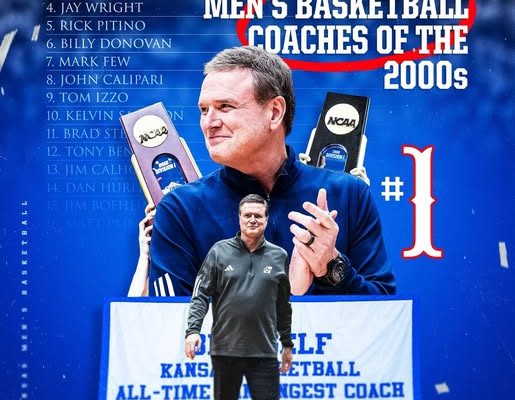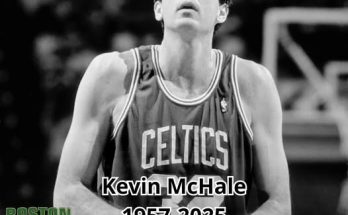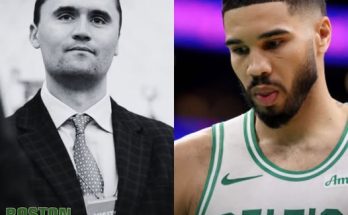The face of the 2000s. Coach Self is the most decorated coach of this era. That phrase carries weight, but not just for what Bill Self has accomplished on the basketball court—it encapsulates a two-decade transformation at Kansas that has been consistent, efficient, and often, simply dominant. There are coaches who win, coaches who endure, and coaches who evolve. Then there is Bill Self, who does all three at a level that very few in the sport’s history can claim. In an era that has seen unprecedented player movement, shifting rules, massive conference realignment, and the rise of one-and-done culture, Self has not only survived—he’s thrived. His legacy is written in banners, yes, but also in how often he’s reinvented himself while never straying from his foundational values of toughness, execution, and defensive accountability. From 2004 to 2025, no college basketball coach has won more games, hung more Big 12 championship banners, or consistently reloaded talent like Bill Self.
Consider the numbers alone. Since taking the reins at Kansas in 2003, Self has led the Jayhawks to 18 Big 12 regular season championships, including a historic run of 14 straight from 2005 to 2018. That streak, in one of the toughest basketball conferences in the country, stands as a monument to consistency and preparation. He’s won two national championships—one in 2008, a second in 2022—and made four Final Fours, compiling over 800 career wins with the vast majority at KU. The numbers are staggering, but they barely scratch the surface. His teams aren’t just winners; they’re measured in the way they play—disciplined, team-first, and impossibly tough in March. His fingerprints are all over every elite squad he’s coached, and while the names may change—Mario Chalmers, Sherron Collins, Thomas Robinson, Devonte’ Graham, Ochai Agbaji, and Jalen Wilson—the results haven’t.
What separates Self from the rest of the elite class isn’t merely the titles. It’s how he’s won. There’s no signature system. No gimmick. He’s never been tied to a single style, which is perhaps the most underrated part of his brilliance. He’s not a full-court pressing guy like Nolan Richardson. He doesn’t run the Princeton or a fast-paced transition offense like Roy Williams. Instead, Self’s system evolves with his players. Some years, his team leads the nation in field goal defense. Others, they shoot the lights out from beyond the arc. Some years he dominates with multiple bigs, like in the days of Cole Aldrich and the Morris twins. Other years, he lets small-ball lineups stretch the floor and run. He molds the system to the talent at hand without losing his defensive principles. That adaptability has allowed him to endure while others fell off, particularly in the chaotic modern era of NIL and the transfer portal.
Beyond the Xs and Os, Self has always been a master motivator. He knows when to push and when to protect. His players routinely exceed expectations, often becoming NBA-ready talents after arriving in Lawrence with relatively little hype. For every blue-chip five-star recruit he’s coached, there are two others who became All-Americans after years of development. Kansas hasn’t always had the most talent, but they almost always play the best team basketball. And that’s a direct reflection of the culture Self has instilled. His practices are notoriously intense. His demands are high. But so too is his loyalty and care. Former players speak reverently of him—not just as a coach, but as a mentor. He doesn’t just build basketball players. He builds men. That’s why so many of his former stars remain connected to the program, returning every summer, mentoring current players, and contributing to what has become one of the most tightly-knit alumni networks in the sport.
And then there’s the pressure. Kansas basketball isn’t just a job; it’s a crown jewel. The fans expect championships. The boosters demand excellence. The spotlight never dims. Coaches in that kind of pressure cooker often crack. But not Self. If anything, he’s only gotten better under pressure. His in-game adjustments are elite, particularly in close games. He’s surgical with his timeouts. He never panics. In March, when so many others fold, he often thrives. That 2008 national title run culminated in one of the most iconic moments in college basketball history—Mario Chalmers’ three-point dagger to send the game to overtime against Memphis, followed by a title-clinching win. Fourteen years later, he did it again, winning it all in 2022 with a gritty, experienced group that overcame a 15-point halftime deficit in the national championship game against North Carolina—the largest comeback in title game history.
His impact on the game stretches beyond just Kansas, though. He’s been a mentor to other coaches. A member of Team USA’s coaching staff. An advocate for the sport’s growth. He’s pushed for recruiting transparency and player-first initiatives, even as he’s remained loyal to the traditional pillars of the college game. Yes, Kansas faced NCAA scrutiny during the FBI’s investigation into college basketball, and yes, Self was at the center of that saga. But he emerged from it with his reputation intact, his contract extended, and his program undeterred. That in itself speaks to his resilience—and to how much the university believes in him. And they have good reason to. No program has remained this stable at this high a level for this long in the modern era. Even bluebloods like Duke, Kentucky, North Carolina, and UCLA have faced down years, coaching turnover, or identity crises. But not Kansas under Self. They’ve remained a machine.
Perhaps the most telling fact about Self’s greatness is how frequently his peers speak about him in reverence. Coaches from smaller schools try to emulate his balance of discipline and flexibility. NBA scouts consistently laud the preparedness of Kansas players. Analysts know when March comes around, you never count out a Self-coached team. His style may not generate viral highlight reels, but it wins—and it ages well. In a culture obsessed with immediate gratification and flashy moments, Self’s model of long-term excellence is both refreshing and rare. It’s old-school toughness with new-age adaptability. It’s development over hype. And it’s sustainable—proven over two decades of dominance.
He’s also carved out a unique place in college basketball history by achieving what few others have: building a Hall of Fame résumé without ever jumping to the NBA. While many coaches chase the next job or the next paycheck, Self has stayed put. Kansas has become home, and Lawrence has become his empire. His name now sits beside legends like Phog Allen and Dean Smith. And deservedly so. When the Hall of Fame came calling in 2017, it wasn’t just a validation of wins. It was a recognition of impact—on players, on the game, on a program, and on an entire era.
Even now, after more than two decades, he’s not slowing down. His recent recruiting classes have been elite. He’s navigated the chaos of the transfer portal with the same calm precision he brings to the bench. His health scare in 2023 only further humanized him, making his 2024 and 2025 campaigns all the more remarkable. That experience, which briefly sidelined him during a postseason run, only reinforced his importance to the game. There was a collective pause throughout college basketball. Is this it? Is this the end of the Self era? But no—he returned, more focused than ever. And his team responded with typical Kansas excellence. Because that’s what he brings—excellence, every year, no matter the obstacles.
There will come a day when Bill Self steps away from the game. When that day comes, the sport will lose not just one of its greatest winners, but also one of its most consistent and compelling leaders. The numbers will tell part of the story: hundreds of wins, multiple national titles, a slew of conference championships. But the greater impact will be felt in the culture he built, the players he shaped, and the standards he set. He is, without question, the face of 2000s college basketball coaching. He has won more, endured more, and adapted more than any of his peers. And perhaps most remarkably, he’s still doing it. Still winning. Still leading. Still redefining what greatness looks like in modern college basketball. There are legends of the past. There are stars of the present. But when history looks back at this era, it won’t be hard to find its defining figure. He’ll be wearing a Kansas pullover, standing courtside with that familiar intensity, and coaching his team deep into March.



